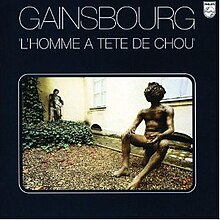L'Homme à tête de chou
| L'Homme à tête de chou | ||||
|---|---|---|---|---|
 |
||||
| Studio album by Serge Gainsbourg | ||||
| Released | 18 November 1976 | |||
| Recorded | Mercury Studios, London and Paris August 16-21, 1976 September 14, 1976 |
|||
| Genre | French rock, art rock, spoken word | |||
| Length | 31:24 | |||
| Label | Philips | |||
| Producer | Philippe Lerichomme | |||
| Serge Gainsbourg chronology | ||||
|
||||
| Professional ratings | |
|---|---|
| Review scores | |
| Source | Rating |
| Allmusic | |
L’Homme à tête de chou is a concept album by Serge Gainsbourg issued in 1976 on Philips.
L'Homme à tête de chou (1976) is a concept album by Serge Gainsbourg. Like its predecessors Histoire de Melody Nelson (1971), Vu de l'extérieur (1973) and Rock Around the Bunker (1975), the album received little attention when it was first issued.
"L’Homme à tête de chou" tells the story of a man in his forties falling in love with a rather free-minded shampoo girl. After the narrator meets the young girl at the barber shop where she works ("Chez Max coiffeur pour hommes"), we learn about their feelings for each other ("Ma Lou Marilou"), their erotic games ("Variations sur Marilou"), and ultimately about Marilou's murder by the narrator, turned jealous lover ("Meurtre à l’extincteur", "Marilou sous la neige"), and finally his decline into madness ("Lunatic Asylum"). Despite the fact that some songs, such as "L'Homme à tête de chou" and "Marilou Reggae", have been well received, "Marilou sous la neige" and the 8-minute epic "Variations sur Marilou" were both commercial failures at the time of their release, and waited several years before being found by a younger audience and recognized as masterpieces of French music.
"Ma Lou Marilou" is inspired by a section of the first movement of Piano Sonata No. 23 in F minor, Op. 57, known as the "Appassionata" composed by Ludwig van Beethoven.
The album took its title from a sculpture by Claude Lalanne, wife of François-Xavier Lalanne bought by Gainsbourg.
"Marilou Reggae" is the first reggae song by Gainsbourg. He revisited it on his 1979 album Aux armes et cætera.
The choreographer Jean-Claude Gallotta created a contemporary dance show for Alain Bashung, with arrangements and additional music by Denis Clavaizolle. This project, initiated in 2008, was disrupted by the death of Bashung, who was to interpret the album on stage in a version slightly modified and completed by Denis Clavaizolle (to make it longer). Denis Clavaizolle tried in late 2008 to realize a satisfactory soundtrack during meetings and discussions with Bashung, with ambiances and sonorities inspired by The Doors, Mahler, and Captain Beefheart, to allow Gallotta to achieve the choreography project which he finally presented on 12 November 2008 at the MC2 in Grenoble.
...
Wikipedia
